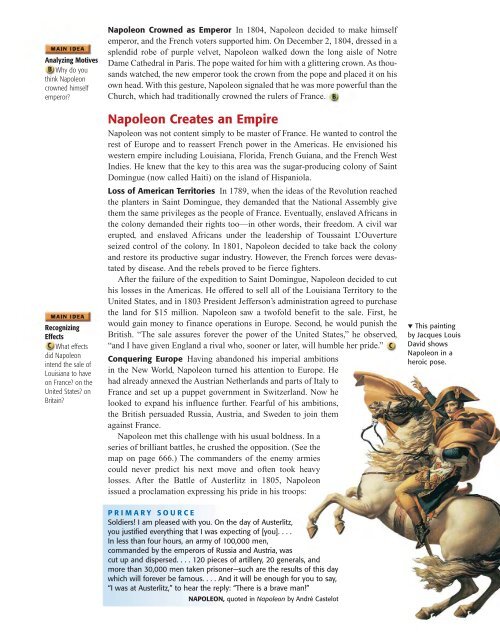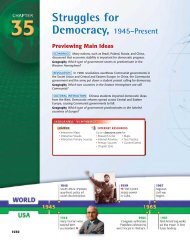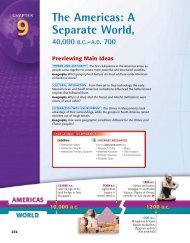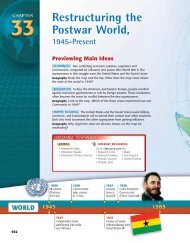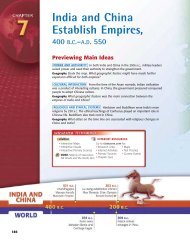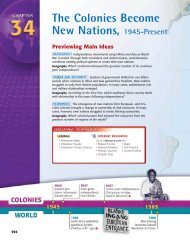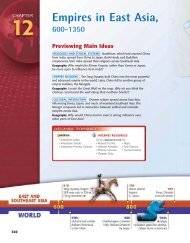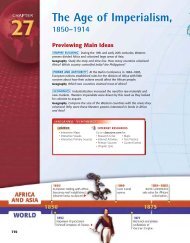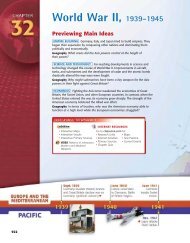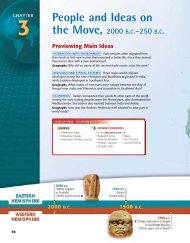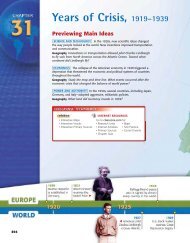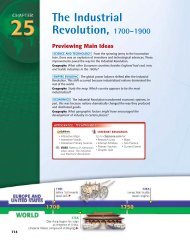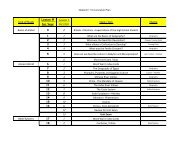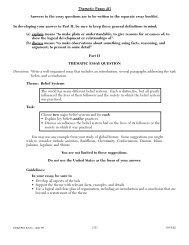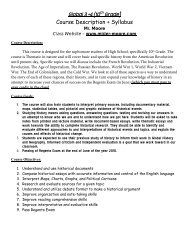The French Revolution and Napoleon, 1789-1815 - First
The French Revolution and Napoleon, 1789-1815 - First
The French Revolution and Napoleon, 1789-1815 - First
Create successful ePaper yourself
Turn your PDF publications into a flip-book with our unique Google optimized e-Paper software.
Analyzing Motives<br />
Why do you<br />
think <strong>Napoleon</strong><br />
crowned himself<br />
emperor?<br />
Recognizing<br />
Effects<br />
What effects<br />
did <strong>Napoleon</strong><br />
intend the sale of<br />
Louisiana to have<br />
on France? on the<br />
United States? on<br />
Britain?<br />
<strong>Napoleon</strong> Crowned as Emperor In 1804, <strong>Napoleon</strong> decided to make himself<br />
emperor, <strong>and</strong> the <strong>French</strong> voters supported him. On December 2, 1804, dressed in a<br />
splendid robe of purple velvet, <strong>Napoleon</strong> walked down the long aisle of Notre<br />
Dame Cathedral in Paris. <strong>The</strong> pope waited for him with a glittering crown. As thous<strong>and</strong>s<br />
watched, the new emperor took the crown from the pope <strong>and</strong> placed it on his<br />
own head. With this gesture, <strong>Napoleon</strong> signaled that he was more powerful than the<br />
Church, which had traditionally crowned the rulers of France.<br />
<strong>Napoleon</strong> Creates an Empire<br />
<strong>Napoleon</strong> was not content simply to be master of France. He wanted to control the<br />
rest of Europe <strong>and</strong> to reassert <strong>French</strong> power in the Americas. He envisioned his<br />
western empire including Louisiana, Florida, <strong>French</strong> Guiana, <strong>and</strong> the <strong>French</strong> West<br />
Indies. He knew that the key to this area was the sugar-producing colony of Saint<br />
Domingue (now called Haiti) on the isl<strong>and</strong> of Hispaniola.<br />
Loss of American Territories In <strong>1789</strong>, when the ideas of the <strong>Revolution</strong> reached<br />
the planters in Saint Domingue, they dem<strong>and</strong>ed that the National Assembly give<br />
them the same privileges as the people of France. Eventually, enslaved Africans in<br />
the colony dem<strong>and</strong>ed their rights too—in other words, their freedom. A civil war<br />
erupted, <strong>and</strong> enslaved Africans under the leadership of Toussaint L’Ouverture<br />
seized control of the colony. In 1801, <strong>Napoleon</strong> decided to take back the colony<br />
<strong>and</strong> restore its productive sugar industry. However, the <strong>French</strong> forces were devastated<br />
by disease. And the rebels proved to be fierce fighters.<br />
After the failure of the expedition to Saint Domingue, <strong>Napoleon</strong> decided to cut<br />
his losses in the Americas. He offered to sell all of the Louisiana Territory to the<br />
United States, <strong>and</strong> in 1803 President Jefferson’s administration agreed to purchase<br />
the l<strong>and</strong> for $15 million. <strong>Napoleon</strong> saw a twofold benefit to the sale. <strong>First</strong>, he<br />
would gain money to finance operations in Europe. Second, he would punish the<br />
British. “<strong>The</strong> sale assures forever the power of the United States,” he observed,<br />
“<strong>and</strong> I have given Engl<strong>and</strong> a rival who, sooner or later, will humble her pride.”<br />
Conquering Europe Having ab<strong>and</strong>oned his imperial ambitions<br />
in the New World, <strong>Napoleon</strong> turned his attention to Europe. He<br />
had already annexed the Austrian Netherl<strong>and</strong>s <strong>and</strong> parts of Italy to<br />
France <strong>and</strong> set up a puppet government in Switzerl<strong>and</strong>. Now he<br />
looked to exp<strong>and</strong> his influence further. Fearful of his ambitions,<br />
the British persuaded Russia, Austria, <strong>and</strong> Sweden to join them<br />
against France.<br />
<strong>Napoleon</strong> met this challenge with his usual boldness. In a<br />
series of brilliant battles, he crushed the opposition. (See the<br />
map on page 666.) <strong>The</strong> comm<strong>and</strong>ers of the enemy armies<br />
could never predict his next move <strong>and</strong> often took heavy<br />
losses. After the Battle of Austerlitz in 1805, <strong>Napoleon</strong><br />
issued a proclamation expressing his pride in his troops:<br />
PRIMARY SOURCE<br />
Soldiers! I am pleased with you. On the day of Austerlitz,<br />
you justified everything that I was expecting of [you]. . . .<br />
In less than four hours, an army of 100,000 men,<br />
comm<strong>and</strong>ed by the emperors of Russia <strong>and</strong> Austria, was<br />
cut up <strong>and</strong> dispersed. . . . 120 pieces of artillery, 20 generals, <strong>and</strong><br />
more than 30,000 men taken prisoner—such are the results of this day<br />
which will forever be famous. . . . And it will be enough for you to say,<br />
“I was at Austerlitz,” to hear the reply: “<strong>The</strong>re is a brave man!”<br />
NAPOLEON, quoted in <strong>Napoleon</strong> by André Castelot<br />
▼ This painting<br />
by Jacques Louis<br />
David shows<br />
<strong>Napoleon</strong> in a<br />
heroic pose.


